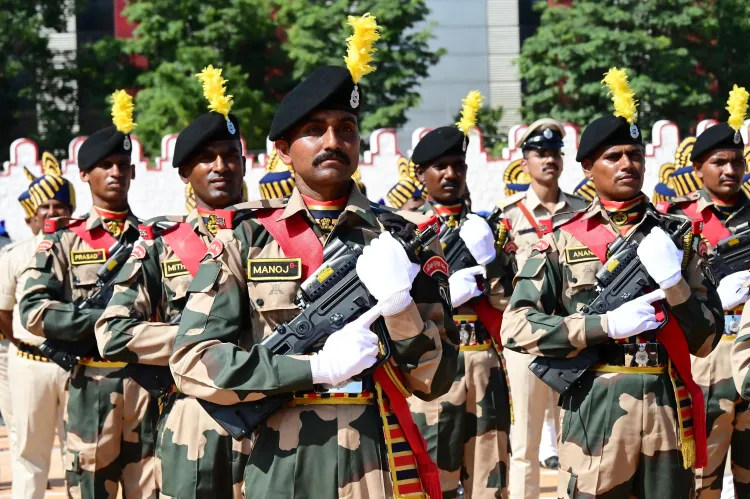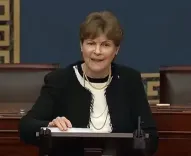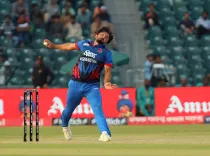Delhi High Court Directs BSF to Implement Third Financial Upgradation under MACP for Long-Serving Personnel

New Delhi, Dec 26 (NationPress) The Delhi High Court has mandated the Border Security Force (BSF) to facilitate the third financial upgradation under the Modified Assured Career Progression (MACP) Scheme for personnel who have reached 30 years of service.
A bench comprising Justices Navin Chawla and Shalinder Kaur heard a petition from retired BSF members contesting the denial of their requests for the third financial upgradation under the MACP Scheme for pension recalibration.
The petitioners sought access to the benefits of the third MACP upon completing 30 years of service in their respective roles before reaching 60 years of age, along with a revision of their basic pay and pension.
These individuals joined the BSF at various times across different ranks within the General Duty and Radio Cadre. Initially classified as Personnel Below Officers Rank (PBORs), many were subsequently promoted to non-gazetted officer ranks, such as Assistant Sub-Inspectors, Sub-Inspectors, and Inspectors.
In a prior ruling in 2019, the Delhi High Court determined that having different retirement ages for various ranks is discriminatory and unconstitutional, instructing a uniform retirement age for all Central Armed Police Forces (CAPFs) personnel, irrespective of rank, within four months.
The court clarified that any increase in retirement age would result in an addition of the differential period to the service duration for calculating retirement benefits, which include pension and gratuity.
"To clarify, the notional retirement date will be determined by adding the differential years to their actual retirement date. Consequently, they would be entitled to arrears of retirement benefits after adjusting for already disbursed amounts," the Delhi High Court had previously ruled.
Previously, according to the BSF Act and Rules, the retirement age for officers from Constable to Commandant was set at 57 years, while those from Deputy Inspector General of Police to Director General had a retirement age of 60 years.
The petitioners asserted that their 30 years of service was completed between the ages of 57 and 60, arguing that had the Union Ministry of Home Affairs executed the recommendations of the 7th Central Pay Commission promptly, they would not have had to retire at 57, thereby allowing them to serve until the age of 60, completing 30 years of service.
They contended that the additional three years resulting from the retirement age extension should be recognized as 'regular service' for calculating MACP benefits for personnel who had not yet turned 60 at the time of the 2019 ruling.
As a result, the court had ordered the authorities to grant the petitioners three equivalent annual increments to their basic pay, asserting that these increments are only awarded for regular service.
The petitioners maintained that, by applying the same standards to the MACP Scheme, they are entitled to the financial upgradation benefits upon completing 30 years of regular service, which would elevate their pay to the next available grade.
They further argued that this upgradation would enhance their basic pay for pension calculations; however, this refixation benefit was never provided.
The petitioners asserted that since their completion of 30 years of service predates the new retirement age, they are entitled to all associated benefits that would have been available had they served during the relevant timeframe.
Moreover, they argued that since the third financial upgradation under the MACP Scheme directly influences pension amounts and arrears through basic pay adjustments, the enhanced retirement age should be factored in when determining the applicability of the third financial upgradation under the MACP Scheme.
The Delhi High Court emphasized that since the authorities acknowledged the increments the petitioners would have earned had they served until the age of 60, they cannot claim that other benefits arising from extended service, including the MACP, will not be extended to the petitioners.
In granting the petition, the Delhi High Court ordered the case of the petitioners to be reviewed by a Screening Committee assigned to assess the claims for the MACP, which would consider their cases as if they remained in 'regular service' until they reached 60 years of age, and to process their claims for the third financial upgradation under the MACP Scheme accordingly.
"This process must be finalized within three months, and if the petitioners are deemed eligible for the third MACP benefit, the relief should be granted, and their pensions adjusted retroactively," the court instructed, clarifying that the third MACP will be notional and the petitioners will not receive additional pay.







